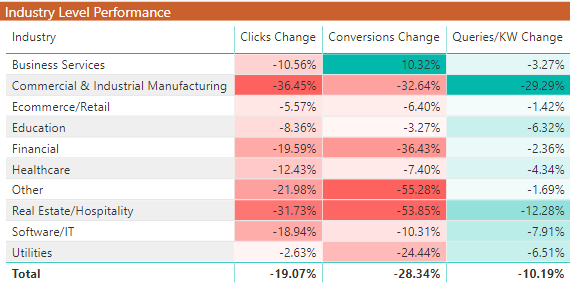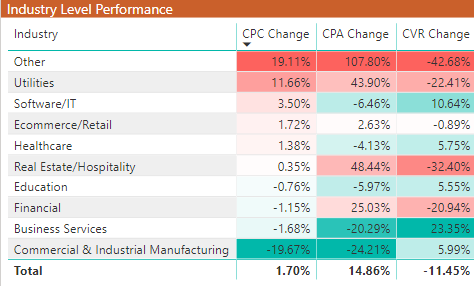We’re now over 90 days out from Google’s close variant match type update. For those of you who might have missed this, Seer’s very own Jane Brady describes it perfectly:
“Google’s intention is to drive ‘more, relevant traffic.’ They describe the update for broad match modifier and phrase match keywords as ‘now including queries that contain words that share the same meaning as the keyword.’ TL;DR: forget misspellings, singular and plural, abbreviations, and word order in your keyword builds.”
Using the millions of data points it has collected, Google provided some initial projections and we’re going to take a look at if Google was right, how did this update affects different industries, and what can be done to mitigate negative effects and capitalize on opportunities.
Was Google Right?
Prior to the launch of the close variant update, Google claimed: “on average, we expect advertisers using broad match modifier and phrase match keywords to see 3-4% more clicks and conversions on these keywords.”
When looking at data across all Seer clients seven days after the update was made on July 31st, this wasn’t necessarily the case.

The table above looks at performance changes for broad modified and phrase match keywords across each industry that Seer services. The first seven days after the update gives a clear picture of the raw effects on paid search campaigns.
Not only did clicks and conversions not increase, on average, they decreased by 19% and 28% respectively.
Additionally, Google also predicted that of the incremental 3-4% lift in clicks that advertisers would see, 85% of those clicks would come from net new search terms that aren’t covered by existing keywords. Once again, this is not what we saw across all clients.
We’d expect that the number of queries that each individual keyword matches to would increase, however, Seer clients saw an average decrease in queries/keyword by 10%. Meaning that existing keywords actually captured less volume than the previous week.
However, clicks, queries/keyword, and even conversions are not always the best indicators of how efficient or profitable a paid search campaign actually is.
How Could This Affect Your Clients?
In order to better understand how this update affects a business’s bottom line, we need to look at efficiency KPIs like CPA. Following that same 7 day window, Seer clients saw the below changes in performance after the update:

An average increase in CPA of almost 15%. What could have caused this?
Pulling data across all clients at scale allows us to quickly identify trends, then pinpoint root causes behind performance fluctuations like these for specific clients. When looking at some of the search terms that were coming in, we were beginning to see lower quality searches matching to existing keywords. The caused a few things to happen:
- A decrease in quality score as ad copy and landing pages were no longer as relevant to these new close variant search terms
- The decrease in quality led to an average increase in CPCs by almost 2% across all clients. Each click was now costing clients more money than it had in the prior week.
- Users were now being matched to ads that didn’t necessarily answer their questions, but they clicked on the ads anyway and did not find what they were looking for on these landing pages. This led to an average decrease in CVR by 11% across all Seer clients.
The combination of these above factors contributed to this increase in CPA. While a 15% increase in CPA seems like a lot, preparing for an update like this and consistently monitoring performance at scale will help to make optimizations that improve performance.
What You Can do to Improve Performance
Whenever Google makes an update that takes control away from advertisers, a moment of panic runs through the digital marketing community. Paid search practitioners spend countless hours selecting the best keywords to run in their campaigns, and with this update, keyword selection has become slightly less relevant.
However, there are several different optimizations that can be made to regain tighter control of the queries that trigger ads for paid search campaigns. One of the most common, yet effective, analyses to irrelevant keywords is a Search Query Analysis.
Using a business intelligence tool, like Seer’s favorite Power BI, can help to quickly and effectively identify root words that are irrelevant and increasing the CPA within different campaigns. Upon seeing the initial swings in performance after this update, the PPC team at Seer got to work optimizing campaigns by negating irrelevant keywords.
As you saw in previous screenshots, every industry was impacted differently by this update. Some clients responded faster to optimizations, while others took longer to gather data as Google consistently made tweaks to its query matching algorithm. A few areas of success that the Seer team has seen have been with clients in the Education and Ecommerce spaces.
Education Client CPA 7/31 - 10/27 (90 days)

Ecommerce Client CPA 7/31 - 10/27 (90 days)

If you’re interested in partnering with Seer to leverage some of these big data insights for your PPC campaigns, reach out and we’re happy to start a conversation to see where we can help!
Be sure to sign up for our email newsletter to stay in the loop on all things digital marketing!


